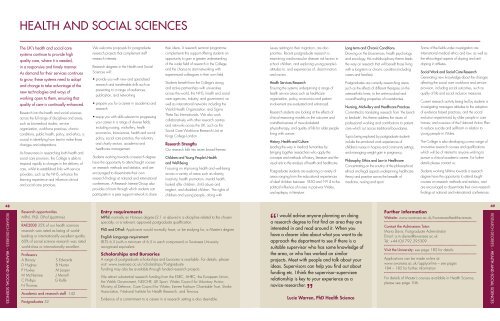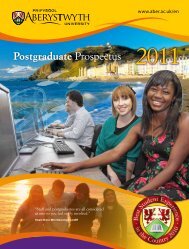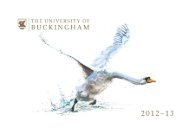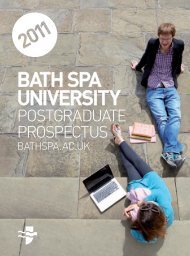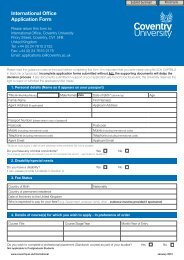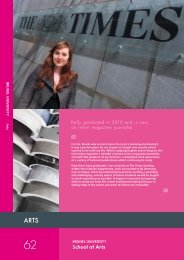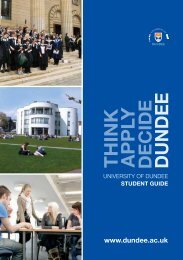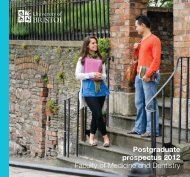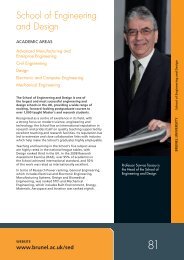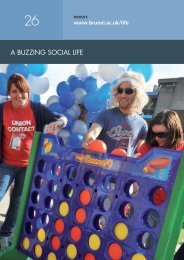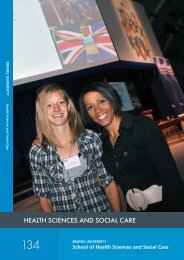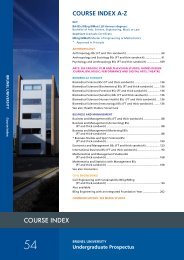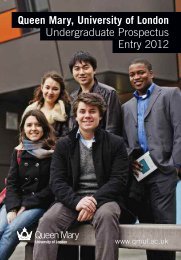www.swansea.ac.uk Postgraduate Prospectus 2012
www.swansea.ac.uk Postgraduate Prospectus 2012
www.swansea.ac.uk Postgraduate Prospectus 2012
- No tags were found...
Create successful ePaper yourself
Turn your PDF publications into a flip-book with our unique Google optimized e-Paper software.
HEALTH AND SOCIAL SCIENCESThe UK’s health and social caresystems continue to provide highquality care, where it is needed,in a responsive and timely manner.As demand for their services continuesto grow, these systems need to adaptand change to take advantage of thenew technologies and ways ofworking open to them, ensuring thatquality of care is continually enhanced.Research into the health and social sciences<strong>ac</strong>ross the full range of disciplines and areas,such as biomedical studies, serviceorganisation, workforce pr<strong>ac</strong>tices, chronicconditions, public health, policy, and ethics, iscrucial in identifying how best to make thosechanges and adaptations.As forerunners in researching both health andsocial care provision, the College is able torespond rapidly to changes in the delivery ofcare, whilst its established links with serviceproviders, such as the NHS, enhance thelearning experience and influence clinicaland social care pr<strong>ac</strong>tices.We welcome proposals for postgraduateresearch projects that complement staffresearch interests.Research degrees in the Health and SocialSciences will:• provide you with new and specialisedresearch and transferable skills such aspresenting to a range of audiences,publication, and networking• prepare you for a career in <strong>ac</strong>ademia andresearch• equip you with skills relevant to progressingyour career in a range of diverse fields,including nursing, midwifery, healtheconomics, biosciences, health and socialpolicy, social care pr<strong>ac</strong>tice, the voluntaryand charity sectors, <strong>ac</strong>ademia andhealthcare management.Students working towards a research degreehave the opportunity to attend taught courseson research methods and statistics, and areencouraged to disseminate their ownresearch findings at national and internationalconferences. A Research Interest Group alsoprovides a forum through which students canparticipate in a peer support network to sharetheir ideas. A research seminar programmecomplements this support offering students anopportunity to gain a greater understandingof the wider field of research in the College,and the chance to start networking withexperienced colleagues in their own field.Students benefit from the College’s strongand <strong>ac</strong>tive partnerships with universities<strong>ac</strong>ross the world, the NHS, health and socialcare agencies, industry, and government, aswell as international networks including theWorld Health Organization, and SigmaTheta Tau Internationals. We also workcollaboratively with other research centresand networks <strong>ac</strong>ross the UK, such as theSocial Care Workforce Research Unit atKings College London.Research StrengthsOur research falls into seven broad themes:Children and Young People’s Healthand Well-BeingFocusing on improving health and well-being<strong>ac</strong>ross a variety of areas such as obesity,in<strong>ac</strong>tivity, health promotion, mental health,looked after children, child abuse andneglect, and disabled children. The rights ofchildren and young people, along withissues relating to their migration, are alsopriorities. Recent postgraduate research isexamining cardiovascular disease risk f<strong>ac</strong>tors inschool children; and exploring young people’sattitudes to, and experiences of, discriminationand r<strong>ac</strong>ism.Health Services ResearchEnsuring the systems underpinning a range ofhealth service areas such as healthcareorganisation, policy, economics and patientinvolvement are evaluated and enhanced.Research students are looking at the effects ofclinical reasoning models on the outcome andcost-effectiveness of musculoskeletalphysiotherapy, and quality of life for older peopleliving with cancer.History, Health and CultureLeading the way in medical humanities bybringing together researchers who apply theconcepts and methods of history, literature and thevisual arts to the analysis of health and healthcare.<strong>Postgraduate</strong> students are exploring a variety ofareas ranging from the educational experiencesof deaf children between 1850 and 1914 to thepolitical influence of nurses in post-war Wales,and epilepsy in literature.Long-term and Chronic ConditionsDrawing on the biosciences, health psychologyand sociology, this multidisciplinary theme leadsthe way on research that will benefit those livingwith a long-term or chronic condition (includingcarers and families).<strong>Postgraduate</strong>s are currently researching areassuch as the effects of different therapies on theosteoarthritic knee, to the anti-microbial andwound-healing properties of invertebrates.Nursing, Midwifery and Healthcare Pr<strong>ac</strong>ticesCommitted to translating research from ‘the benchto bedside’, this theme address the issues ofprofessional working and contributions to patientcare which cut <strong>ac</strong>ross traditional boundaries.Topics being explored by postgraduate studentsinclude the emotional work experiences ofchildren’s nurses in hospice and community settings,and managing weight gain in pregnancy.Philosophy, Ethics and Law in HealthcareConcentrating on the scrutiny of the philosophical,ethical and legal aspects underpinning healthcaretheory and pr<strong>ac</strong>tice <strong>ac</strong>ross the breadth ofmedicine, nursing and sport.Some of the fields under investigation areinternational medical ethics and law, as well asthe ethico-legal aspects of doping and antidopingin athletes.Social Work and Social Care ResearchGenerating new knowledge about the changesaffecting the social care workforce and serviceprovision, including social outcomes, such asquality of life and social inclusion measures.Current research <strong>ac</strong>tivity being led by students isinvestigating managers attitudes to the adoptionof evidence based pr<strong>ac</strong>tices, and the socialexclusion experienced by older people in carehomes; and a review of the National Action Planto reduce suicide and self-harm in relation toyoung people in Wales.The College is also developing a new range ofinnovative research courses and qualificationswhich will be of interest to anyone wishing topursue a clinical <strong>ac</strong>ademic career. For furtherdetails please cont<strong>ac</strong>t us.Students working full-time towards a researchdegree have the opportunity to attend taughtcourses on research methods and statistics, andare encouraged to disseminate their own researchfindings at national and international conferences.48RESEARCH DEGREES – HEALTH AND SOCIAL SCIENCESResearch opportunitiesMPhil, PhD, DProf (part-time)RAE2008 35% of our health sciencesresearch was rated as being of worldleadingor internationally excellent quality.60% of social science research was ratedworld-class or internationally excellent.ProfessorsA BorsayD HughesP HuxleyM McNameeC PhillipsN ThomasS EdwardsB HunterM JasperJ MerrellG RolfeAcademic and research staff 142<strong>Postgraduate</strong>s 52Entry requirementsMPhil: normally an Honours degree (2.1 or above) in a discipline related to the chosenspecialty, or a relevant, approved postgraduate qualification.PhD and DProf: Applicants would normally have, or be studying for, a Master’s degreeEnglish Language requirement:IELTS 6.5 (with a minimum of 6.5 in e<strong>ac</strong>h component) or Swansea Universityrecognised equivalent.Scholarships and BursariesA range of postgraduate scholarships and bursaries is available. For details, pleasevisit: <strong>www</strong>.<strong>swansea</strong>.<strong>ac</strong>.<strong>uk</strong>/scholarships/<strong>Postgraduate</strong>Funding may also be available through funded research projects.We attr<strong>ac</strong>t substantial research funding from the ESRC, AHRC, the European Union,the Welsh Government, NISCHR, UK Sport, Wales Council for Voluntary Action,Ministry of Defence, Care Council for Wales, Esmee Fairburn Charitable Trust, StrokeAssociation, National Institute for Health Research, and Tenovus.Evidence of a commitment to a career in a research setting is also desirable.“I would advise anyone planning on doinga research degree to first find an area they areinterested in and read around it. When youhave a clearer idea about what you want to doappro<strong>ac</strong>h the department to see if there is asuitable supervisor who has some knowledge ofthe area, or who has worked on similarprojects. Meet with people and talk about yourideas. Supervisors can help you find out aboutfunding etc. I think the supervisor-superviseerelationship is key to your experience as anovice-researcher.”Lucie Warren, PhD Health ScienceFurther informationWebsite: <strong>www</strong>.<strong>swansea</strong>.<strong>ac</strong>.<strong>uk</strong>/humanandhealthsciencesCont<strong>ac</strong>t the Admissions Tutor:Maria Davis, <strong>Postgraduate</strong> AdministratorEmail: a.m.davies@<strong>swansea</strong>.<strong>ac</strong>.<strong>uk</strong>Tel: +44 (0)1792 295309Visit the University: see page 182 for detailsApplications can be made online at:<strong>www</strong>.<strong>swansea</strong>.<strong>ac</strong>.<strong>uk</strong>/applyonline – see pages184 – 185 for further informationFor details of Master’s courses available in Health Science,please see page 106.49RESEARCH DEGREES – HEALTH AND SOCIAL SCIENCES


